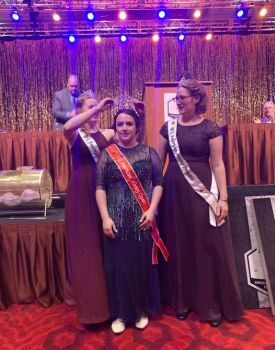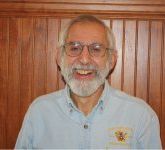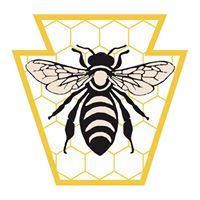2025 Fall Conference, Membership Meeting, & Honey Judge Training
"Beekeeping Like a Boss"
The 2025 PSBA Fall Conference and Membership Meeting is scheduled for Friday, November 14 through Sunday, November 16, 2025 at the Ramada Hotel and Convention Center, State College, PA.
We are happy to announce that David Burns (www.honeybeesonline.com), Nina Sokolov (UC Berkeley), Christina Grozinger (Penn State), Margarita Lopez-Uribe (Penn State), and Robyn Underwood (Penn State) will headline our presenter list.
We are also hosting Honey Judging Training by the American Honey Show Training Council. Judges: Brutz English, Steve Genta, John Welty, Amy Kaiser, Val Hawthorne. Sign up separately for honey judge training at https://www.eventbrite.com/e/1511146272179?aff=oddtdtcreator
Past vendors include Maxant Industries, Betterbee, Mann Lake Ltd, Dadant & Sons, Strong Microbials, Véto-pharma, Wicwas Press, Apimaye USA, Apimon LLC, Bee Club Sales, Danenhower Apiaries, PA Veterans Farming Network, The Bee & Butterfly Habitat Fund, North American Land Trust, and The Keepers Hive. Many of these are expected to attend our 2025 conference.
Hotel Rooms: For reservations call (814) 238-3001 and use Group Code BEE25. The group room rate is $89 plus taxes including buffet breakfast. Room reservations deadline is 7 November 2025, but the hotel may honor the rate for a late reservations. Suites are NOT available at the group room rate.
The conference agenda is available here.
Click here to register.PSBA Summer Picnic - July 19, 2025
Our family-friendly summer picnic was held at 11am on Saturday, July 19, 2025 at DelGrosso's Amusement Park in Tipton, PA. We will have a business meeting, show & tell, great food & drink, and a presentation about using oxalic acid based miticide VarroxSan. "What is VarroxSan? VarroxSan is a highly effective varroa control treatment, based on oxalic acid dihydrate in slow-release strips, ensuring correct dosage that covers at least three live cycles of the varroa mite. Oxalic acid is an organic compound, naturally found in many plants."
The meeting is free to attend. If you want to participate in the picnic lunch, the cost for lunch is $5/person. PSBA is charging $10/person & refunding $5/person at the picnic. This is due to "no shows" in past free events where we provide food for people who responded they would attend, but then not attend. This amounts to a $10 penalty for no-shows. Click here to register.

2025 Pennsylvania Honey Queen Brochures
Queen Olivia Kaltenbach's 2025 Pennsylvania Honey Queen Brochures are now available. A $10 donation for a pack of 100 brochures is requested. You can purchase brochures by contacting Cathy and Lucy at honeyqueen@pastatebeekeepers.org or you may print them from this pdf file if you prefer.
Pennsylvania Plant and Pollinator Protection Act
Updated 12/3/2024 - PSBA has been working on the new PA Plant and Pollinator Protection Act to replace the existing bee law. We received formal confirmation that Senator Carolyn Comitta has introduced the Plant and Pollinator Protection Act. It now has a bill number, SB 1198, and has been referred to the Senate Agriculture and Rural Affairs Committee.
Here are some additional documents as a condensed summary and talking points for stakeholders.
PSBA is currently not supporting or opposing the Act (pending information regarding regulations).
Beekeeper of the Year for 2024 Selected
Western PA 2024 Beekeeping Seminar Photos
Feb 9-10, 2024 - This was a fantastic event with hundreds in attendance! Many thanks to everyone who volunteered.
Pennsylvania Farm Show 2024
The 2024 PA Farm Show was held January 6 - 13 at the Farm Show Complex, Harrisburg. The Pennsylvania Farm Show is the Pennsylvania State Beekeepers Association's showcase annual event and the primary source of fund raising for the Pennsylvania Honey Queen Program. More information is available by clicking here.
PA State Apiary Inspection
The 2025 PA State Apiary Inspection season has begun. Find your local inspector by clicking on your county on our map. The entire list of local inspector's names and contact information is also available on that same page.
Click on images below to go to page
Spotted Lanternfly Area Expanded

The Spotted Lanternfly quarantine area has once again been expanded. Details at the PDA website.
Further information for beekeepers and residents:
- Brief Summary of what the Spotted Lanternfly Quarantine Means to You
- Best Management Practices for Beekeepers in the Quarantine Area
- Checklist for Residents of Quarantine Area
- Spotted Lanternfly Management Resources
- Spotted Lanternfly Permit Training for Businesses: Pennsylvania: Moving bees in or out of Pennsylvania? Free training from PSU Extension covering what you need to do and know.
2022 American Honey Queen

Lucy Winn
Lucy Winn, 2020/2021 Pennsylvania Honey Queen, has been chosen as the 2022 American Honey Queen at the American Beekeeping Federation Conference. Congratulations Lucy!
2021 Fall Conference Photos
2021 Fall Conference photos (Photos by Mark Gingrich)Beekeeper of the Year for 2020 and 2021 Selected


The 2020 Beekeeper of the Year award was presented to Vince Aloyo and the 2021 Beekeeper of the Year award was presented to Mark Antunes at this year's PSBA fall conference.
FieldWatch Program
FieldWatch is a free and voluntary online mapping tool that specialty crop growers and beekeepers can use to map the locations of their crops/hives. Pesticide applicators can use this to see the crops and hives near their application sites and plan accordingly. It is being offered in PA as a collaboration between the PA Dept. of Agriculture and Penn State Extension. Details
How to Keep Bees During COVID-19
Article by Robyn Underwood and Margarita López-Uribe, Department of Entomology, Penn State University.
López-Uribe Lab: Beekeeping Resources at Penn State
Here are some useful links that may be helpful to beekeepers everywhere.
- If you're a beginner, get started with 'Beekeeping, Where to Begin'.
- If you will be installing bee packages this spring, here is a video detailing a step-by-step installation method.
- Here are some handy articles including Varroa Mite Monitoring Tools and Oxalic Acid treatments.
Queen Honey Bee Development
"The queen is the most important individual in a colony. She is the only bee capable of producing workers and tens of thousands of workers are required for strong colonies." Read the full article from PennState Extension:
An Introduction to Queen Honey Bee Development. A pdf version is also available.
Honeybee Viruses
Penn State Extension has posted an article with information on "Viruses in Honey Bees".
PSBA Helping Honey Bees Brochures
The 2020 Pennsylvania State Beekeepers Helping Honey Bees Brochures are available. A $10 donation/100 is requested (donations would be paid to Treasurer). To purchase brochures contact: Charlie Vorisek. Or you may print them from the pdf file, if you prefer.
Beekeepers Information
Preventing the Spread of American FoulbroodDifferences Between AFB-EFB-PMS
American Foulbrood Information (by Penn State University)
American Foulbrood Information
American Foulbrood Information (by Meghan Milbrath)
For the health and safety of all of our honeybees, it is important that your hives be registered. It is also required by state law. Click for the Mail-In Registration Form, or for Online Registration. Here are helpful instructions for Online Registration.
Beescape
Beescape provides a tool for beekeepers, gardeners, growers and land managers to assess the quality of their landscapes for supporting managed honey bees and wild bees." (Beescape is a partnership of the Center for Pollinator Research at Penn State University, Dickinson College, Purdue University, University of Illinois, Urbana-Champaign, University of Minnesota, and University of California, Davis.) Visit Beescape
Managing Varroa Mites
A Varroa Management Decision Tool is available at the Honey Bee Health Coalition website.
López-Uribe Lab: Managing Honeybees
Using an evidence-based approach to manage honey bees in light of wild bee declines
Model Beekeeping Ordinance
We now have a PA Model Beekeeping Ordinance available to view/download.
Pollen Foraging Study
A pollen foraging study has been completed in West Virginia through a Northeast SARE farmer grant endeavoring to determine which plants were being foraged through the months of July through October and which plants were contributing the most to the bees' diet. They looked at pollen collected by honey bees in five West Virginia locations, and pollen collected in one of the locations for three consecutive years. Many of the plants common in West Virginia are also common in parts of Pennsylvania. The final report is available on the Northeast SARE website.
Dr. Samuel Ramsey's varroa research

Dr. Samuel Ramsey spoke at our 2018 fall conference. View the video he did on the same subject for the Danish Beekeeper's Association. Dr. Ramsey previously won the international Three Minute Thesis (3MT) competition for his thesis 'Varroa destructor: The Curious Case of the Bee Mite's Bite' (Video introduces new ideas on varroa destructor).
Tracking the Health of Feral Bees in PA
"Since 2016 the López-Uribe lab has been leading a citizen science project that aims to map and characterize the health status of feral bees across Pennsylvania." Read their full article.
The Pennsylvania Pollinator Protection Plan
View video
View static version of video as pdf
The Pennsylvania Pollinator Protection Plan (P4) was developed with input from 36 individuals representing 28 state and national organizations and stakeholder groups. It summarizes the current state of pollinators in Pennsylvania and provides recommendations for best practices and resources to support and expand pollinator populations. It is a wonderful guide for all Pennsylvanians! The document is fluid and will be reviewed and updated annually.
Details at the Center for Pollinator Research (under Bee Health)
PSBA Bee Friendly Program

Bee Friendly PA is a new initiative from the Pennsylvania State Beekeeping Association (PSBA) that recognizes bee-friendly communities across the state: those that encourage beekeeping as well provide hospitable habitats and pollinator-friendly pest management practices.
"Why did my honey bees die?"
Wondering what happened? Read the 2016 article at beeinformed.org
Sentinel Apiary Project
Bee Informed Partnership is looking for beekeeping groups from across the country who manage 8 or more colonies and are interested to participate in their Sentinel Apiary Project. If you chose to participate, your club will receive monthly disease reports of Nosema and Varroa levels as well as colony health monitoring with hive scales. Data collected can be shared among those in your group, as your Sentinel Apiary will represent beekeeping conditions specific to your region. All personal data collected will remain confidential; however hive scale and disease data from Sentinel apiaries will be on a shared, public website. Subsidies available for the cost of hive scales for qualifying groups. Details and application available at beeinformed.org.
Bee Behavior Expert Studies Honeybee Swarms
Read the Smithsonian article about Thomas Seeley: "The Secret Life of Bees".
Pesticide Information
A list of Pesticide descriptions and information is available on our Current Research page.
Protecting Honey Bees from Chemical Pesticides
Documents and Brochures Available in PDF Format
WHO: BTi (used for mosquito control) not toxic to honey bees
Are Honey Bees pollinators and beneficial insects or pests?
Value of Honey Bees in Pennsylvania
Give Honey Bees a Helping Hand
Zoning Ordinances, Gardens and Honey Bees
Voluntary Best Management Practices/Code of Conduct for Safely Maintaining Honey Bee Colonies




